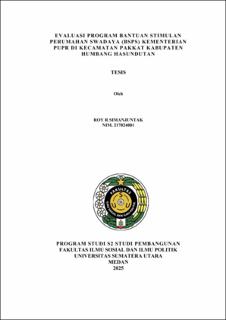Evaluasi Program Bantuan Stimulan Perumahan Swadaya (BSPS) Kementerian PUPR Di Kecamatan Pakkat Kabupaten Humbang Hasundutan

Date
2025Author
Simanjuntak, Roy R
Advisor(s)
Badaruddin
Irmayani, Tengku
Metadata
Show full item recordAbstract
BSPS (Community-Based Housing Incentive) program is the government's
strategic policy for increasing the housing quality of people who have low income
through self-based assistance. The objective of this research is to evaluate the
implementation of the BSPS program in Pakkat Sub-district, Humbang
Hasundutan Regency, using the policy of evaluation framework of William N.
Dunn (2003) which includes six dimensions: effectiveness, efficiency, adequacy,
equalization, responsiveness, and accuracy. Besides that, it also analyzes the role
of social capital and participative development in supporting the success of the
program and identifies the supporting and the inhabiting factors in its
implementation. The research uses a qualitative approach with phenomenological
method. The data are collected through in-depth interviews, observation, and
documentary analysis. The result of the research shows that the BSPS program
has generally fulfilled Dunn's six evaluation criteria with high effectiveness and
efficiency because of the people's active involvement in all; ‘marsiadapari’
(togetherness) culture. Although the aid does not adequately fulfill ideal needs,
the spirit of community self-reliance and participation are very strong. The aid is
equally and responsively distributed in the local context and on target, based on
direct verification. Local social capital has become the key factor of success,
supported by participated development principles in the whole stages of the
program. The supporting factors include high participation, field facilitator, local
cultural value, and the mechanism of inclusive selection while the main obstacle
lies in the limitation of the aid funds and geographical conditions. The research
theoretically contributes to the development of local-based policy evaluation and
practically provides strategic recommendations for the fairer, more participative
and sustainable housing policy incentives in rural areas.
